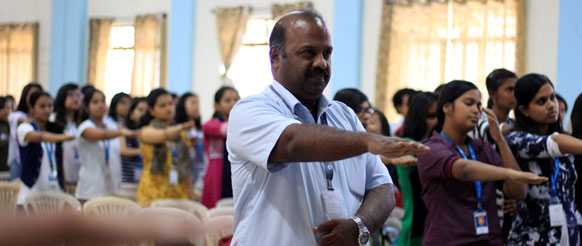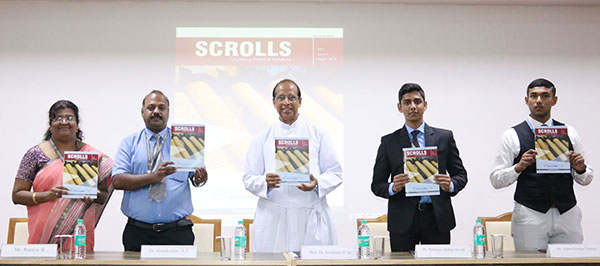
Best Practices
MOCK ELECTION (ELECTION 2018)
PURPOSE:
The ‘Mock Election’ or Eleccion 2018 was conducted on 08/03/2018 in the political science department for the purpose of enhancing awareness between or among the students of [B.A] Ist, IInd & IIIrd Year [JPOL/HEP] 120 students. The fundamental principles followed in the election process include nomination of candidates, party-based campaigning, general interaction with the public incorporating both students and teachers addressing various issues related to the party agendas and manifestos.
SCOPE:
The basic steps involved in the event ranging from press interaction of the audience including the students, infrastructural arrangement, ballot box and the general public. Therefore the process of election represents general election and prepares the student for the very basic exercise in the outside world at large.
The mock election started with general guidelines to the voters regarding the exercise of their popular power followed by the normal view-point of the candidates, which in turn would have decided the voter’s choice and the ultimate election results. Though the entire procedure was conducted in a systematic manner with the main objective of ensuring activation or initiation of democratic spirit among the students for people have a significant role to play in the process of public administration. However the organization of this event and its overall functioning to a great extent is contingent upon the disciplinary factor.
Thus this was a major event of our department conducted once a year. It is a representation of Elections that are held in the country, there were various activities like Campaign, Debate and Press Conference where the contestants introduced their Party and their manifesto in front of all the students of Political science department. The Activity consist of three rounds, the first is a Introduction of the contestants Party and their Manifestos, the second includes Press conference where questions are asked by the students to the Candidates and finally the voting takes place in the third round after the voters oath taking ceremony.
This year 5 students stood for the Elections from the 1st and 2nd years. The 3rd year students are not allowed to stand for the election as they are the organizers. The ultimate winner of this year Election was Ms. Reshma of 1st Year with majority of votes. This time NOTA was also introduced which played major role in changing the result of the election.
DIFFICULTIES AND RESOURCES REQUIRED:
Although there were some difficulties in managing the operation of the event, this activity of mock election helped the students to learn more of the election process in a country and how the power of one individual can be exercise by voting for the right candidate in times of election is important.
Moreover the resources required to conduct it includes digital tools along with human power as the results were reported electronically.
The activity represents an important stage of learning for the future responsible citizens in a democracy like India and also holds ramification for higher level of education for it gives a practical exposure to the students through training them in different roles respectively.

DEPARTMENT OF HISTORY
2019-20
Title of the practice: Nirūpaṇe – Narrating History
Objective of the practice:
A creative and pragmatic education involves the habit of personal investigation. The act of personal investigation requires self-study to be followed by self-thinking and analysis. The students of History require the habit of reading, researching and creatively express their learning. The objective behind pioneering ‘Nirūpaṇe- Narrating History’ is
• To provide the history students of Kristu Jayanti College a platform to immerse themselves in understanding history and its many aspects by actively engaging in discovering various historical facts and queries, conducting a research on them and expressing their narratives
• To develop and inculcate a sense of historical enquiry among the undergraduate BA History students
• To create a culture of life-long learning towards a better understanding of one’s own experiences and historical happening around them
Context:
The 21st generation learners have great access to web and social media. They are interested in making larger conversations on issues that need to be tackled on a global level. Study of History does not stop at learning historical dynasties or personalities or places, it also addresses latest socio, economic and humanitarian issues. Understanding indigenous practices, science, culture and knowledge also forms an integral part of learning history or social sciences. The department of History was fortunate to have students from various cultural backgrounds from all the states of India with a passion of representing the history and social traditions of their native. The department wanted to introduce this practice to support their ability to develop creativity and encourage learning through discovery, analysis and innovation. This practice ‘Nirūpaṇe – Narrating History’ was introduced in 2018 to engage and train the students in a collaborative and participative manner for maximizing learning and unleashing 21st century students’ potential.
The Practice:
Nirūpaṇe – Narrating History, was introduced as part of the History Department activities in two forms, i.e Scrolls, the annual History magazine and History Square, a monthly wall magazine for all the undergraduate history students. The students were also encouraged to adopt field based research project and express their findings in Nirūpaṇe.
The first element of Nirūpaṇe, Scrolls was introduced in the academic year 2018-19 and saw an overwhelming contribution from the students. With the success of the first magazine, the Department, since the inception of the academic year 2019-2020, brought to its students yet another platform to express their narratives in the form of the History Square. The present academic session also brought out the second volume of Scrolls. The activities carried out in Nirūpaṇe functions also as an introduction of basic research to the students.
Scrolls and History Square witnessed many well researched and written articles that touched upon both Indian and World history and explored the arenas of culture, tradition, gender, architecture and many more showcasing the endeavour put forth by students. Scrolls Vol.1 and 2 is an accumulation of articles, book reviews, poems, facts, sketches and photographs on history. It was announced to the history students regarding the publication of a magazine and guidelines were given to the writers to help them navigate their writings. There was an overwhelming responses of articles delivered to a team of editors consisting of history student coordinators and their team, along with the faculty coordinator who then scrutinises the articles and guide the students on various ground to make their work better. The students were also encouraged to narrate their observations during their field visit and recount their understanding of the sites and stories in the magazine. The magazine also gave an opportunity for students who completed their dissertation in history providing them a platform to present their arguments and findings. The History Generic Elective class that consisted of students from various other Faculties and Schools also contributed their articles. The magazine also showcased budding photographers and artist and provided a space for their captured stories.
The History Square, the history wall magazine, was introduced to give ample opportunities for the history students to showcase their creativity and narrations. The Wall magazine was placed in the outdoors for students of various schools and faculties to refresh their memory or to learn something new about the happenings in history. The wall magazine was updated every month giving equal opportunity for students to be represented in their form of writings, sketches and creativity.
Evidence of Success [2019-2020]
1. Students are enthusiastically contributing to these productions through their field based researches. It increased from 45 contributions to 91 contributions in the first two years
2. There is also an increase in number of enrolment for history dissertation.
3. The undergraduate students exposed to basic research were able to present valid arguments and findings and won prizes in paper presentations contests held at National level Seminars competing with researchers of high calibre


